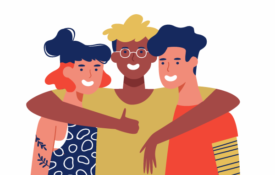-
Getting Rid Of Head Trash: Five Thoughts That Are Holding You Back
“You have no idea how unfocused I am. I can’t finish a task to save my life. I’m sure it is because of how lazy I am. I have always been prone to distraction.” I am on a zoom call with my client, Carry, listening to her talk through her most recent challenge prioritizing at work. “I know my colleagues think I’m focused,” Carry continues, when I point to the results of her recent evaluation, showing positive marks in drive, focus and follow-through. “But they don’t know the real me. It might look that way from the outside, but if they could see inside my head, they would know the truth.” Thoughts drive behaviors and behaviors drive impact.
-
Bring Fun Back Into Your Friendships—Despite the Covid Pandemic
Dear Ask Bonds, I miss my friends. Social distancing makes it hard—and not that fun—to get together. And it’s not even an option to see friends who live far away—no one can travel because of the pandemic. But there’s another problem: Everyone is so stressed and overwhelmed these days that we can’t find time to talk on the phone. Weeks go by without contact! And when we talk, all we do is share our worries. The lack of connection with the friends I love is really getting me down. What can I do? —Cut Off in PA Dear Cut Off, You’re not the only one!
-
You’re Waiting for Election Results. It’s Agony. Here’s What to Do.
Right now you probably feel like a spring that’s been tightly compressed under enormous weight. From the outside, it appears still. Inside it is coursing with intense potential (anxious!) energy just dying for release. All elections elicit this feeling to some degree. But the 2020 contest has raised the stakes, adding looming threats of disinformation and interference, contested results and a president who has repeatedly antagonized a deeply polarized electorate. It is an extremely stressful moment. The best description I’ve seen of our collective anxiety was from Mother Jones editor in chief Clara Jeffery: “The entire country is awaiting a biopsy result.” ...
-

Positive Outlook Predicts Less Memory Decline
The happier we feel, the less likely we are to experience memory decline.
-
The Psychology of Fact-Checking
APS Fellow/Author: Stephen J. Ceci Distortions and outright lies by politicians and pundits have become so common that major news outlets like the Associated Press, CNN, BBC, Fox News,and Washington Post routinely assign journalists and fact-checkers to verify claims made during stump speeches and press briefings. The motivation to uncover falsehoods and misleading statements taken out of context is laudable. But when it comes to real-world complexities, the trouble is that people often see different things when looking at the same event, a phenomenon repeatedly documented by psychologists.
-
What If Friendship, Not Marriage, Was at the Center of Life?
... In the past few decades, Americans have broadened their image of what constitutes a legitimate romantic relationship: Courthouses now issue marriage licenses to same-sex couples, Americans are getting married later in life than ever before, and more and more young adults are opting to share a home rather than a marriage license with a partner. Despite these transformations, what hasn’t shifted much is the expectation that a monogamous romantic relationship is the planet around which all other relationships should orbit. ... A few decades after the erosion of romantic friendship began, Americans’ conception of marriage shifted.

